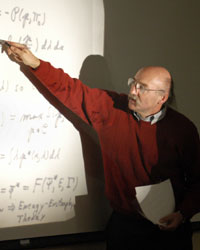
Majda began his scientific career as a Courant Instructor at
the Courant Institute from 1973-1975. Prior to returning
to the Courant Institute in 1994, he held professorships at
Majda’s
primary research interests are modern applied mathematics in
the broadest possible sense merging asymptotic methods,
numerical methods, physical reasoning and rigorous
mathematical analysis.
He is well known for both his theoretical contributions to
partial differential equations and his applied contributions
to diverse areas such as scattering theory, shock waves,
combustion, incompressible flow, vortex motion, turbulent
diffusion, and atmosphere ocean science.
Majda is
a member of the National Academy of Sciences, the American
Academy of Arts and Sciences, and has received numerous
honors and awards including the National Academy of Science
Prize in Applied Mathematics, the John von Neumann Prize of
the Society of Industrial and Applied Mathematics, and the
Gibbs Prize of the American Mathematical Society.
In 2012 he received the Wiener
Prize of the American Mathematical Society and the Society
of Industrial and Applied Mathematics and in 2015 Majda
received the Lagrange Prize, awarded every four years by the
International Council of Industrial and Applied Mathematics.
He has been awarded the Medal of the College de France,
twice, and is a Fellow of the Japan Society for the
Promotion of Science. Majda
has received three honorary doctorates including one from
his undergraduate alma mater, Purdue University. He
has given plenary one hour lectures at both ICM (Kyoto 1990)
and the first ICIAM (Paris 1987) and is both an AMS and SIAM
Fellow.
In his years at the Courant Institute, Majda has created the
Center for Atmosphere Ocean Science with seven
multi-disciplinary faculty to promote cross-disciplinary
research with modern applied mathematics in climate modeling
and prediction.
Andrew J. Majda Biography
(Long Version)
Andrew J. Majda is the Morse Professor of Arts and Sciences
at the Courant Institute of New York University. He was born
in East Chicago, Indiana on January 30, 1949. He received a
B.S. degree from Purdue University in 1970 and a Ph.D.
degree from Stanford University in 1973.
Majda’s primary research interests are modern applied
mathematics in the broadest possible sense merging
asymptotic methods, numerical methods, physical reasoning
and rigorous mathematical analysis.
He is well known for both his theoretical contributions to
partial differential equations and his applied contributions
to diverse areas such as scattering theory, shock waves,
combustion, incompressible flow, vortex motion, turbulent
diffusion, and atmosphere ocean science.
Majda is a member of the National Academy of Sciences and
has received numerous honors and awards including the
National Academy of Science Prize in Applied Mathematics,
the John von Neumann Prize of the Society of Industrial and
Applied Mathematics, the Gibbs Prize of the American
Mathematical Society and the Wiener Prize of AMS/SIAM. He is
also a member of the American Academy of Arts and Science.
He has been awarded the Medal of the College de France,
twice, and is a Fellow of the Japan Society for the
Promotion of Science. He has received an honorary doctorate
from his undergraduate alma mater, Purdue University, as
well as honorary degrees from Fudan University and China
Northwestern University. He has given plenary one hour
lectures at both ICM (Kyoto 1990) and the first ICIAM (Paris
1987).
Majda began his scientific career as a Courant Instructor at
the Courant Institute from 1973-1975. Prior to returning to
the Courant Institute in 1994, he held professorships at
Princeton University (1984-1994), the University of
California, Berkeley (1978-1984), and the University of
California, Los Angeles (1976-1978). In the past several
years at the Courant Institute, Majda has created the Center
for Atmosphere Ocean Science with eight multi-disciplinary
faculty to promote cross-disciplinary research with modern
applied mathematics in climate modeling and prediction.
Majda’s current research interests include multi-scale
multi-cloud modeling for the tropics, stochastic and
statistical modeling for climate, and novel mathematical
strategies for prediction and data assimilation in complex
multi-scale systems.
Majda has mentored nearly thirty Ph.D. students and over
thirty post-doctoral fellows thus far. Majda’s published
books include “Compressible Fluid Flow and Systems of
Conservation Laws in Several Space Variables” by
Springer-Verlag, “Vorticity and Incompressible Flow” with A.
Bertozzi by Cambridge University Press, Majda’s lecture
notes for the Courant Lecture Note Series of the American
Math. Society “Introduction to PDE’s and Waves for the
Atmosphere and Ocean,” also for the CRM monograph series
“Information theory and Stochastics for Multiscale Nonlinear
Systems,” with M. Grote and R. Abramov, by American
Mathematical Society, and “Nonlinear Dynamics and
Statistical Theories for Basic Geophysical Flows” with
Xiaoming Wang by Cambridge University Press. He has a new
book with John Harlim, “Filtering Complex Turbulent Systems”
by Cambridge University Press.